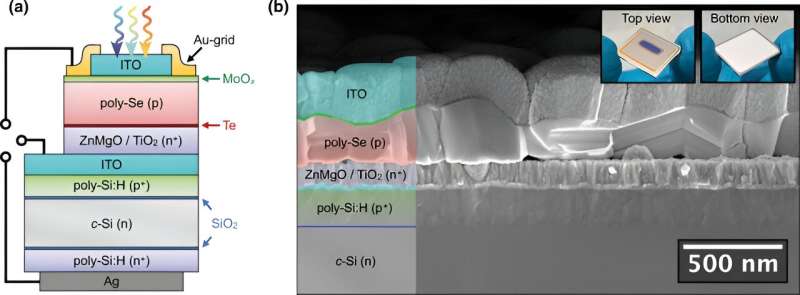
A team of physicists and engineers at Technical University of Denmark reports that it is possible to build a working selenium–silicon tandem solar cell, a combination that could theoretically improve the efficiency of solar cells to 40%. The study is published in the journal PRX Energy.
Solar cells have revolutionized electricity generation. Making use of solar energy has reduced reliance on fossil fuels, which in turn has led to reductions in greenhouse gas emissions causing climate change. But solar cells still have a lot of room for improvement—they currently capture approximately 27% of the energy in the sunlight that strikes them, a figure that is near the theoretical limit for such technology.
Prior research has suggested that a way to get around the inefficiencies inherent in silicon-based solar cells is to add layers of other materials that also capture some of the sun's energy by increasing the wavelengths that can be absorbed.
For this new study, the research team turned to selenium, a semiconducting material that was used to make solar cells before scientists discovered that silicon was more suitable. The team chose it because it has different photon-absorbing properties, a characteristic that allows for the creation of a dual-material solar cell, and it has a wide bandgap.
To make the cell, the researchers created a sandwich. They started with a standard silicon base, added some oxide layers, and then added a thin film of selenium. Placing it in sunlight showed that the combined cell was able to generate 1.68 volts of electricity and that it had a conversion efficiency of 2.7%.
The research team describes their tandem cell as promising, noting that its efficiency could be increased by 10 times simply by improving resistance, which would lower the loss of voltage. Their calculations suggest that refinement of the cell should at some point lead to an efficiency rating of approximately 40%.
More information: Rasmus Nielsen et al, Monolithic Selenium/Silicon Tandem Solar Cells, PRX Energy (2024). DOI: 10.1103/PRXEnergy.3.013013
© 2024 Science X Network
Citation: Researchers build selenium–silicon tandem solar cell that could improve efficiency to 40% (2024, April 2) retrieved 2 April 2024 from https://techxplore.com/news/2024-04-seleniumsilicon-tandem-solar-cell-efficiency.html
This document is subject to copyright. Apart from any fair dealing for the purpose of private study or research, no part may be reproduced without the written permission. The content is provided for information purposes only.
